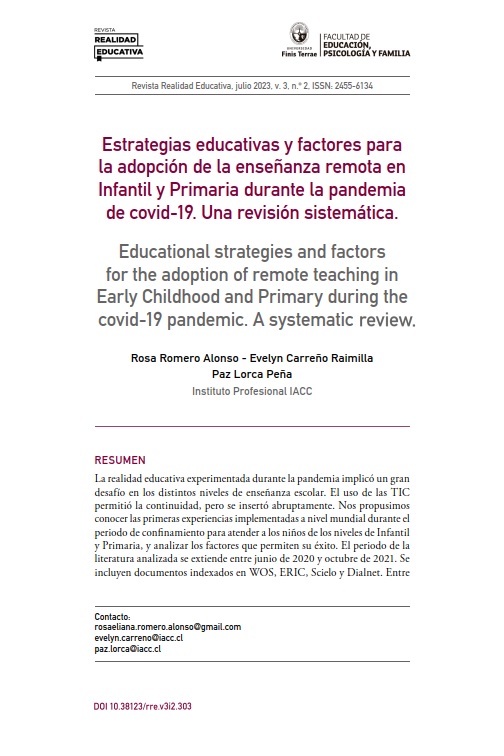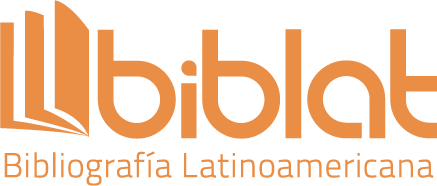Estrategias educativas y factores para la adopción de la enseñanza remota en Infantil y Primaria durante la pandemia de Covid-19
Una revisión sistemática
DOI:
https://doi.org/10.38123/rre.v3i2.303Palabras clave:
enseñanza remota de emergencia, métodos de enseñanza, revisión de literatura, factores de aprendizajeResumen
La realidad educativa experimentada durante la pandemia implicó un gran desafío en los distintos niveles de la enseñanza escolar. El uso de las TIC permitió la continuidad, pero se insertó abruptamente. Nos propusimos conocer las primeras experiencias implementadas a nivel mundial durante el periodo de confinamiento para atender a los niños de los niveles de Infantil y Primaria, y analizar los factores que permiten su éxito. El periodo de la literatura analizada se extiende entre junio de 2020 y octubre de 2021. Se incluyen documentos indexados en WOS, ERIC, Scielo y Dialnet. Entre los principales hallazgos y conclusiones se destaca que las tecnologías fueron una ayuda, pero requieren de un uso adecuado. La inequidad de acceso a la tecnología es un factor relevante junto con la capacidad de uso de la misma por parte de los padres. Por otro lado, el cambio de prácticas educativas requiere una preparación permanente de los profesores para el uso de las TIC.
Descargas
Citas
Alabdulkarim, S., Khomais, S., Hussain, I. y Gahwaji, N. (2021). Preschool Children’s Drawings: A Reflection on Children’s Needs within the Learning Environment Post Covid-19 Pandemic School Closure. Journal of Research in Childhood Education, 36(2), 1-16. https://doi.org/10.1080/02568543.2021.1921887
Alonso Sanz, Á., Barbero Rubio, A. y Gil Luciano, B. (2020). Consideraciones sobre conducta infantil y confinamiento en la crisis por covid-19 desde la perspectiva funcional del análisis de la conducta y ACT. International Journal of Psychology and Psychological Therapy, 20(2). https://www.ijpsy.com/volumen20/num2/538/consideraciones-sobre-conducta-infantil-ES.pdf
Ávila-Pérez, M., García-Herrera, D., Mena-Clerque, S. y Erazo-Álvarez, J. (2020). Desafíos de la educación: Perspectivas desde los estudiantes y padres de familia. Koinonía, 5(5), 91. https://doi.org/10.35381/R.K.V5I5.1035
Bakir, N. y Phirangee, K. (2021). ZOOMing into a Community: Exploring Various Teaching Practices to Help Foster Sense of Community and Engagement in Emergency Remote Teaching. Journal of Teaching and Learning with Technology, 10(1). https://doi.org/10.14434/jotlt.v9i2.31226
Bao, X., Qu, H., Zhang, R. y Hogan, T. (2020). Modeling reading ability gain in kindergarten children during covid-19 school closures. International Journal of Environmental Research and Public Health, 17(17), 6371. https://doi.org/10.3390/ijerph17176371
Barnett, W., Grafwallner, R. y Weisenfeld, G. (2021). Corona pandemic in the United States shapes new normal for young children and their families. European Early Childhood Education Research Journal, 29(1), 109-124. https://doi.org/10.1080/1350293X.2021.1872670
Bermeo-Suco, L. y Torres-Palchisaca, Z. (2021). La educación física como medio para mantener la salud emocional en escolares durante la pandemia. Koinonía, 6(2), 97. https://doi.org/10.35381/R.K.V6I2.1230
Boivin, N. (2021). Co-participatory multimodal intergenerational storytelling: Preschool children’s relationship with modality creating elder inclusion. Journal of Early Childhood Literacy. https://doi.org/10.1177/14687984211012055
Brambilla, C. (2021). Conocimiento, tiempo y educación: la escuela trastrocada en tiempos disruptivos. 593 Digital Publisher CEIT, 6(2-1), 53-75. https://doi.org/10.33386/593dp.2021.2-1.500
Burga-Rodrigo, G., Vargas-Miñano, K., Borja-Goñi, E. y Vásquez-Villanueva, S. (2020). Satisfacción y desempeño en los docentes de educación primaria, en las instituciones educativas particulares del Perú, durante el periodo de la pandemia. Polo de Conocimiento, 5(10), 841-867. https://doi.org/10.23857/pc.v5i10.1855
Bushweller, K. (2 de junio de 2020). How Covid-19 Is Shaping Tech Use. What That Means When Schools Reopen. Education Week, 39(34). https://www.edweek.org/technology/how-covid-19-is-shaping-tech-use-what-that-means-when-schools-reopen/2020/06
Cabrera, L. (2020). Efectos del coronavirus en el sistema de enseñanza: aumenta la desigualdad de oportunidades educativas en España. Revista de Sociología de la Educación-RASE, 13(2), 114-139. https://doi.org/10.7203/RASE.13.2.17125
Cachón-Zagalaz, J., Sánchez-Zafra, M., Sanabrias-Moreno, D., Lara-Sánchez, A. y Zagalaz-Sánchez, M. (2020). Systematic Review of the Literature About the Effects of the Covid-19 Pandemic on the Lives of School Children. Frontiers in Psychology, 11, 569348. https://doi.org/10.3389/fpsyg.2020.569348
Canet-Juric, L., Gelpi Trud, R., Gall, J., López-Morales, H., del Valle, M. y Andrés, M. (2021). Are our children engaged with school in the era of covid-19? Journal of Psychological and Educational Research, 29(1), 116-139. http://hdl.handle.net/11336/135705
Castillo-Castillo, G. y Álvarez-Lozano, M. (2021). Factores socioemocionales que afectan el desarrollo educativo por pandemia del Covid-19. Koinonía, 6(3), 60-83. http://dx.doi.org/10.35381/r.k.v6i3.1304
Codina, L. (2018). Revisiones bibliográficas sistematizadas. Procedimientos generales y framework para ciencias humanas y sociales. Universitat Pompeu Fabra.
De Jesús, S., Ribas, J., González, V., Frías, C. y Joy, P. (2020). La importància del professional de la psicologia educativa en temps de pandèmia. Anuari de l’Educació de Les Illes Balears, (2020 ESPECIAL), 436-457.
Eadie, P., Levickis, P., Murray, L., Page, J., Elek, C. y Church, A. (2021). Early Childhood Educators’ Wellbeing During the Covid-19 Pandemic. Early Childhood Education Journal, 49(5), 903-913. https://doi.org/10.1007/s10643-021-01203-3
Erades, N. y Morales, A. (2020). Impacto psicológico del confinamiento por la covid-19 en niños españoles: un estudio transversal. Revista de Psicología Clínica con Niños y Adolescentes, 7(3), 27-34. https://doi.org/10.21134/rpcna.2020.mon.2041
Etchebehere Arenas, G., León Siri, R. D. de, Silva Paredes, F., Fernández, D. y Quintana, S. (2021). Percepciones y emociones ante la pandemia: recogiendo las voces de niños y niñas de una institución de educación inicial pública del Uruguay. Psicología, Conocimiento y Sociedad, 11(1), 8-35. https://doi.org/10.26864/PCS.v11.n1.1
Fusté Forné, M. (2021). Encuentros online en educación infantil: una experiencia vincular y educativa en tiempos de covid-19. Páginas de Educación, 14(1), 52-72. https://doi.org/10.22235/pe.v14i1.2204
García-Herrera, D., Mena-Clerque, S., Erazo-Álvarez, J. y Muñoz-Vázquez, G. (2020). NEO LMS enseñanza matemática: Uso de recursos digitales. Koinonía, 6(1), 793-814. http://dx.doi.org/10.35381/r.k.v5i1.810
Gaudreau, C., King, Y., Dore, R., Puttre, H., Nichols, D., Hirsh-Pasek, K. y Michnick Golinkoff, R. (2020). Preschoolers Benefit Equally from Video Chat, Pseudo-Contingent Video, and Live Book Reading: Implications for Storytime During the Coronavirus Pandemic and Beyond. Frontiers in Psychology, 11(2158). https://doi.org/10.3389/fpsyg.2020.02158
Gelir, I. y Duzen, N. (2021). Children’s changing behaviours and routines, challenges and opportunities for parents during the covid-19 pandemic. Education 3-13 International Journal of Primary, Elementary and Early Years Education, 50(7), 907-917. https://doi.org/10.1080/03004279.2021.1921822
González-Rivas, R., Gastélum-Cuadras, G., Velducea, W., Bustos, J. y Esparza, S. (2021). Analysis of teaching experience in Physical Education classes during covid-19 confinement in Mexico. Retos, 42, 1-11. https://doi.org/10.47197/RETOS.V42I0.86242
Grant, M. y Booth, A. (2009). A typology of reviews: An analysis of 14 review types and associated methodologies. Health Information and Libraries Journal, 26(2), 91-108. https://doi.org/10.1111/J.1471-1842.2009.00848.X
Guarnizo, N., Talero, E. y Campos, F. (2021). Cambios de estrategias didácticas de la gimnasia en cuarentena: un estudio de caso. Retos, 42, 316-322. https://doi.org/10.47197/RETOS.V42I0.86527
Guller, B., Yaylaci, F. y Eyuboglu, D. (2021). Those in the shadow of the pandemic: impacts of the covid-19 outbreak on the mental health of children with neurodevelopmental disorders and their parents. International Journal of Developmental Disabilities, 68(6), 1-13. https://doi.org/10.1080/20473869.2021.1930827
Gunder, A., Vignare, K., Adams, S., McGuire, A. y Rafferty, J. (2021). Optimizing High-Quality Digital Learning Experiences: A Playbook for Faculty. Every Learner Everywhere.
Hu, X., Chiu, M. M., Leung, W. M. V. y Yelland, N. (2021). Technology integration for young children during covid-19: Towards future online teaching. British Journal of Educational Technology, 52(4), 1513-1537. https://doi.org/10.1111/bjet.13106
Jacovkis, J. y Tarabini, A. (2021). Covid-19 y escuela a distancia: viejas y nuevas desigualdades. Revista de Sociología de la Educación-RASE, 14(1), 85-102. https://doi.org/10.7203/RASE.14.1.18525
Jiménez, Ó., Torres, J. y Cruz, P. (2020). La competencia digital del profesorado y la atención a la diversidad durante la covid-19. Estudio de caso. Revista de Comunicación y Salud, 10(2), 483-502. https://doi.org/10.35669/RCYS.2020.10(2).483-502
Kamei, A. y Harriott, W. (2021). Social Emotional Learning in Virtual Settings: Intervention Strategies. International Electronic Journal of Elementary Education, 13(3), 365-371. https://eric.ed.gov/?id=EJ1297841
Khamsuk, A. y Whanchit, W. (2021). Storytelling: An alternative home delivery of English vocabulary for preschoolers during covid-19’s lockdown in southern Thailand. South African Journal of Childhood Education, 11(1), 1-13. https://doi.org/10.4102/sajce.v11i1.897
Kim, J. (2020). Learning and Teaching Online During Covid-19: Experiences of Student Teachers in an Early Childhood Education Practicum. International Journal of Early Childhood, 52,145-158. https://doi.org/10.1007/s13158-020-00272-6
Košir, K., Dugonik, Š., Huskić, A., Gračner, J., Kokol, Z. y Krajnc, Ž. (2020). Predictors of perceived teachers’ and school counsellors’ work stress in the transition period of online education in schools during the covid-19 pandemic. Educational Studies, 48(6), 844-848. https://doi.org/10.1080/03055698.2020.1833840
Kundu, A. y Bej, T. (2021). Covid 19 response: An analysis of teachers’ perception on pedagogical successes and challenges of digital teaching practice during new normal. Education and Information Technologies, 26, 6879 [retracted]. https://doi.org/10.1007/s10639-021-10503-5
Lafave, L., Webster, A. y McConnell, C. (2021). Impact of Covid-19 on Early Childhood Educator’s Perspectives and Practices in Nutrition and Physical Activity: A Qualitative Study. Early Childhood Education Journal, 49(5), 935-945. https://doi.org/10.1007/s10643-021-01195-0
Limbers, C. (2021). Factors Associated with Caregiver Preferences for Children’s Return to School during the Covid-19 Pandemic. Journal of School Health, 91(1), 3-8. https://doi.org/10.1111/josh.12971
López Gómez, S., Martín Gómez, S. y Vidal Esteve, M. (2021). Análisis de aplicaciones móviles dirigidas a la infancia: características técnicas, pedagógicas, de diseño y contenido. Revista Iberoamericana de Educación, 85(1). https://doi.org/10.35362/rie8514013
Luna-Miranda, C., García-Herrera, D., Castro-Salazar, A. y Erazo-Álvarez, J. (2020). Uso alternativo de las TIC en Educación Básica Elemental para desarrollar la lectoescritura. Koinonía, 5(1), 711-730. https://doi.org/10.35381/R.K.V5I1.806
Macías Medina, D., Santacruz Valencia, L. y Gómez, J. (2021). La importancia de enseñar secuenciación en edades tempranas: una puerta al desarrollo de competencias STEM. IE Comunicaciones: Revista Iberoamericana de Informática Educativa, 33, 31-42.
Martínez-Vérez, M., Vilas-Ares, M. y Montero-Seoane, A. (2021). Infancias confinadas: construyendo la escuela desde la educación artística. Arte, Individuo y Sociedad, 33(3), 837-858. https://doi.org/10.5209/ARIS.70230
McIntyre, L., Neece, C., Sanner, C., Rodriguez, G. y Safer-Lichtenstein, J. (2021). Telehealth Delivery of a Behavioral Parent Training Program to Spanish-Speaking Latinx [sic] Parents of Young Children with Developmental Delay: Applying an Implementation Framework Approach. School Psychology Review, 51, 1-15. https://doi.org/10.1080/2372966X.2021.1902749
Mckenna, M., Soto-Boykin, X., Cheng, · Ke, Haynes, E., Osorio, A. y Altshuler, J. (2021). Initial Development of a National Survey on Remote Learning in Early Childhood During Covid-19: Establishing Content Validity and Reporting Successes and Barriers. Early Childhood Education Journal, 49, 815-827. https://doi.org/10.1007/s10643-021-01216-y
Mumbardó-Adam, C., Barnet-López, S. y Balboni, G. (2021). How have youth with Autism Spectrum Disorder managed quarantine derived from covid-19 pandemic? An approach to families’ perspectives. Research in Developmental Disabilities, 110. https://doi.org/10.1016/J.RIDD.2021.103860
Munir, S., Erlinda, R. y Afrinursalim, H. (2021). Students’ Views on the Use of WhatsApp during Covid-19 Pandemic: A Study at IAIN Batusangkar. IJELTAL, 5(2). https://doi.org/10.21093/IJELTAL.V5I2.740
Ozamiz-Etxebarria, N., Santamaría, M., Mondragón, N. y Naiara Berasategi S. (2021). Estado emocional del profesorado de colegios y universidades en el norte de España ante la covid-19. Revista Española de Salud Pública, 95, 1-8. https://medes.com/publication/160206
Paiva, E., Silva, L. da, Machado, M., Aguiar, R. de, Garcia, K. da S. y Acioly, P. (2021). Comportamento infantil durante o distanciamento social na pandemia de covid-19. Revista Brasileira de Enfermagem, 74(Suppl 1). https://doi.org/10.1590/0034-7167-2020-0762
Peredo Videa, R. (2020). ¿Volvemos a clases? Análisis desde la Psicología Educativa ante los efectos de la pandemia por covid-19. Revista de Investigación Psicológica, (Especial), 42-56. http://www.scielo.org.bo/scielo.php?script=sci_arttext&pid=S2223-30322020000300007
Plascencia-González, M. (2021). Infancia y tele-escuela en preescolares rurales: reflexiones a partir de experiencias docentes previas a la pandemia. Ra Ximhai, 17(1), 15-36. https://dialnet.unirioja.es/servlet/articulo?codigo=8523376
Posso Pacheco, R., Otáñez Enríquez, N., Cóndor Chicaiza, J., Cóndor Chicaiza, M. y Lara Chala, L. (2021). Educación Física remota: juegos motrices e inteligencia kinestésica durante la pandemia covid-19. PODIUM - Revista de Ciencia y Tecnología en la Cultura Física, 16(2), 564-575. http://scielo.sld.cu/scielo.php?script=sci_arttext&pid=S1996-24522021000200564
Poulain, T., Meigen, C., Sobek, C., Ober, P., Igel, U., Körner, A., Kiess, W. y Vogel, M. (2021). Loss of childcare and classroom teaching during the covid-19-related lockdown in spring 2020: A longitudinal study on consequences on leisure behavior and schoolwork at home. PLOS ONE, 16. https://doi.org/10.1371/JOURNAL.PONE.0247949
Priyadarshani, H. y Jesuiya, D. (2021). Teacher’s Perception on Online Teaching Method during Covid-19: With Reference to School Level Teachers at Faculty of Education, The Open University of Sri Lanka. Shanlax International Journal of Education, 9(2), 132-140. https://doi.org/10.34293/education.v9i2.3662
Ramos, M., Bamdad, T. y Lloyd, C. M. (2021). Strategies to Virtually Support and Engage Families of Young Children during Covid-2 19 (and beyond). Child Trends. https://t.ly/mOqV
Reséndiz-Aparicio, J. (2021). Cómo afecta a los niños la contingencia por covid-19. Boletín Médico del Hospital Infantil de México, 78(3), 216-224. https://doi.org/https://doi.org/10.24875/bmhim.20000140
Reynoso, O., Portillo, S. y Castellanos, L. (2020). Modelo explicativo de la satisfacción del profesorado en el periodo de enseñanza remota. IJERI: International Journal of Educational Research and Innovation, 15,229-247. https://doi.org/10.46661/ijeri.5236
Rico-Díaz, J. y Rodríguez-Fernández, J. E. (2020). #NÓSXOGAMOSNACASA, recursos lúdico-educativos para un confinamiento en familia. Revista Gallega de Educación, 1, 36-40. https://rge.gal/wp-content/uploads/2020/12/nosxogamosnacasa-recursos-ludico-educativos-para-un-confinamento-en-familia-yq8esjtd97.pdf
Rivero-Espinosa, E. y Bahena-Rivera, A. (2021). Interrelaciones socioeducativas, educación en línea y bienestar durante el confinamiento por covid-19. Revista Prisma Social, 33, 119-136.
Saldaña, J. (2013). The Coding Manual for Qualitative Researchers. SAGE Publications.
Sánchez-Barbero, B., García, M. J. C., Sánchez, J. M. C., Sánchez, M. M. R. y Muelas, D. R. (2020). Elaborando cómics en tiempo de confinamiento para aprender matemáticas en Educación Infantil y Primaria. Magister, 32(1), 97-101. https://doi.org/10.17811/MSG.32.1.2020.97-101
Santos Nonato, E. do R., Valda Souza Sales, M. y Ribeiro Cavalcante, T. (2021). Cultura digital e recursos pedagógicos digitais: um panorama da docência na covid-19. Práxis Educacional, 17(45), 8-32. https://doi.org/10.22481/praxisedu.v17i45.8309
Schafer, E., Dunn, A. y Lavi, A. (2021). Educational Challenges During the Pandemic for Students Who Have Hearing Loss. 52(3), 889-898. https://doi.org/10.1044/2021_LSHSS-21-00027
Schreier, M. (2012). Qualitative content analysis in practice. SAGE.
Segura Domínguez, F. y Ojuel Solsona, M. (2021). Ante la incertidumbre, el trabajo en red nos da confianza, seguridad y esperanza. Àmbits de Psicopedagogia i Orientació, 54, 206-220. https://doi.org/10.32093/ambits.vi54.5019
Silva, A. da, Silva, C. da, Tinôco, R. de G., Araújo, A. de, Venâncio, L., Sanches Neto, L., Freire, E. dos S. y da Conceição, W. (2021). Dilemmas, Challenges and Strategies of Physical Education Teachers-Researchers to Combat Covid-19 (SARS-CoV-2) in Brazil. Frontiers in Education, 6. https://doi.org/10.3389/feduc.2021.583952
Soltaninejad, M., Babaei-Pouya, A., Poursadeqiyan, M. y Arefi, M. (2021). Ergonomics factors influencing school education during the covid-19 pandemic: A literature review. Work, 68(1), 69-75. https://doi.org/10.3233/WOR-203355
Soltero-González, L. y Gillanders, C. (2021). Rethinking Home-School Partnerships: Lessons Learned from Latinx Parents of Young Children During the Covid-19 Era. Early Childhood Education Journal, 49(5), 965-976. https://doi.org/10.1007/s10643-021-01210-4
Sousa-Ferreira, R., Campanari-Xavier, R. A. y Rodrigues Ancioto, A. S. (2021). La realidad virtual como herramienta para la educación básica y profesional. Revista Científica General José María Córdova, 19(33), 223-241. https://doi.org/10.21830/19006586.728
Staller, K. (2015). Qualitative analysis: The art of building bridging relationships. Qualitative Social Work, 14(2), 145-153. https://doi.org/10.1177/1473325015571210
Stites, M., Sonneschein, S. y Galczyk, S. (2021). Preschool Parents’ Views of Distance Learning during Covid-19. Early Education and Development, 32(7), 923-939. https://doi.org/10.1080/10409289.2021.1930936
Susilowati, I., Nugraha, S., Alimoeso, S. y Hasiholan, B. (2021). Screen Time for Preschool Children: Learning from Home during the Covid-19 Pandemic. Global Pediatric Health, 8. https://doi.org/10.1177/2333794X211017836
Szpunar, G., Cannoni, E. y di Norcia, A. (2021). La didattica a distanza durante il lockdown in Italia: il punto di vista delle famiglie. Journal of Educational, Cultural and Psychological Studies (ECPS Journal), 23,137-155. https://doi.org/10.7358/ecps-2021-023-szpu
Tan, F., Gong, X., Zhang, X. y Zhang, R. (2021). Preschoolers’ Approaches to Learning and Family-school Connections during Covid-19: An Empirical Study Based on a Wuhan Sample. Early Childhood Education Journal, 49(5), 869-879. https://doi.org/10.1007/s10643-021-01217-x
Tambyraja, S., Farquharson, K. y Coleman, J. (2021). Speech-Language Teletherapy Services for School-Aged Children in the United States During the Covid-19 Pandemic. Journal of Education for Students Placed at Risk, 26(2). https://doi.org/10.1080/10824669.2021.1906249
Tosh, K., Woo, A. y Doan, S. (2021). Did Experience with Digital Instructional Materials Help Teachers Implement Remote Learning During the Covid-19 Pandemic? Informes de Investigación RAND EDUCATION AND LABOR, RR-A134-8, 3-6. https://doi.org/10.7249/RR-A134-8
Tsz, D., Ng, K., Reynolds, R., Man, H., Chan, Y., Li, X. H., Kai, S. y Chu, W. (2020). Business (Teaching) as Usual Amid the Covid-19 Pandemic: A Case Study of Online Teaching Practice in Hong Kong. Journal of Information Technology Education: Research, 19, 775-802. https://doi.org/10.28945/4620
US Department of Education. (2020). Evidence-Based and Promising Practices to Support Continuity of Learning for Students with Disabilities Practices and Resources to Support Parents and Families. TOPICAL ISSUE BRIEF, 11430. https://t.ly/IOZ3
Vecilla, I. (2021). Atención educativa online a alumnas con discapacidad visual de 3 a 5 años: «Nuestra casa no es mi cole». RED Visual: Revista Especializada en Discapacidad Visual, 77. https://doi.org/10.53094/JXGW7586
Verlenden, J., Pampati, S., Rasberry, C., Liddon, N., Hertz, M. y Kilmer, G. (2021). Association of Children’s Mode of School Instruction with Child and Parent Experiences and Well-Being During the Covid-19 Pandemic - Covid Experiences Survey. MMWR. Morbidity and Mortality Weekly Report, 70(11). http://dx.doi.org/10.15585/mmwr.mm7011a1
Virgili Torras, E. (2021). Emergency Remote Teaching: las TIC aplicadas a la educación durante el confinamiento por covid-19. Innoeduca. International Journal of Technology and Educational Innovation, 7(1), 122-136. https://doi.org/10.24310/INNOEDUCA.2021.V7I1.9079
Werfel, K., Grey, B., Johnson, M., Brooks, M., Cooper, E., Reynolds, G., Deutchki, E., Vachio, M. y Lund, E. (2021). Transitioning Speech-Language Assessment to a Virtual Environment: Lessons Learned from the ELLA Study. Language, Speech, and Hearing Services in Schools, 52(3). https://doi.org/10.1044/2021_LSHSS-20-00149
Zimmett, J. (2020). Redesigning (virtual) learning with a “love ethic” in the wake of covid-19. Education for Information, 36(2), 207-209. https://doi.org/10.3233/EFI-200004
Zolfaghari, M., Austin, C., Kosko, K. y Ferdig, R. (2020). Creating Asynchronous Virtual Field Experiences with 360 Video. Journal of Technology and Teacher Education, 28(2), 315-320. https://doi.org/https://doi.org/10.1007/s13158-020-00272-6

Publicado
Cómo citar
Número
Sección
Licencia
Derechos de autor 2023 Rosa Romero Alonso, Evelyn Carreño Raimilla, Paz Lorca Peña

Esta obra está bajo una licencia internacional Creative Commons Atribución-NoComercial-SinDerivadas 4.0.
Los contenidos de esta revista se distribuyen bajo una licencia Atribución/Reconocimiento-NoComercial-SinDerivados 4.0 Internacional.













